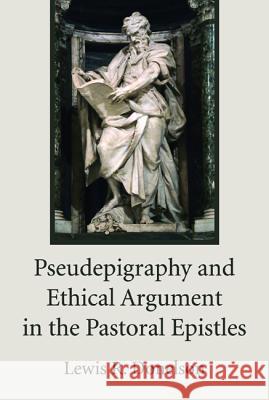Pseudepigraphy and Ethical Argument in the Pastoral Epistles » książka
Pseudepigraphy and Ethical Argument in the Pastoral Epistles
ISBN-13: 9781498238205 / Angielski / Miękka / 2015 / 230 str.
Pseudepigraphy and Ethical Argument in the Pastoral Epistles
ISBN-13: 9781498238205 / Angielski / Miękka / 2015 / 230 str.
(netto: 132,12 VAT: 5%)
Najniższa cena z 30 dni: 137,21
ok. 16-18 dni roboczych.
Darmowa dostawa!
By employing analyses of the literary structure of ancient pseudepigraphical letters and of the logical structure of ethical argument, this study discovers in the Pastoral Epistles a consistent theological ethic that has cosmological and cultic grounding. First, an investigation of Greco-Roman religious pseudepigraphical letters identifies those literary patterns that determine the form of argumentation in the Pastoral Epistles. Second, an investigation of the structure of ethical argument produces categories for organizing and analyzing the apparently disorganized arguments in these letters. Finally, this study concludes that the author of the Pastoral Epistles builds a coherent theological ethic by falsifying Pauline history and by grounding his ethical warrants in church officers. Dr. Lewis R. Donelson is Ruth A. Campbell Professor of New Testament at Austin Presbyterian Theological Seminary. His primary teaching interests include New Testament, Greek, Greco-Roman culture, and early Christian history.
By employing analyses of the literary structure of ancient pseudepigraphical letters and of the logical structure of ethical argument, this study discovers in the Pastoral Epistles a consistent theological ethic that has cosmological and cultic grounding.First, an investigation of Greco-Roman religious pseudepigraphical letters identifies those literary patterns that determine the form of argumentation in the Pastoral Epistles. Second, an investigation of the structure of ethical argument produces categories for organizing and analyzing the apparently disorganized arguments in these letters. Finally, this study concludes that the author of the Pastoral Epistles builds a coherent theological ethic by falsifying Pauline history and by grounding his ethical warrants in church officers.Dr. Lewis R. Donelson is Ruth A. Campbell Professor of New Testament at Austin Presbyterian Theological Seminary. His primary teaching interests include New Testament, Greek, Greco-Roman culture, and early Christian history.











